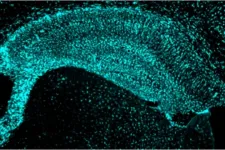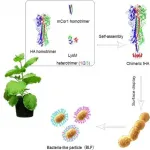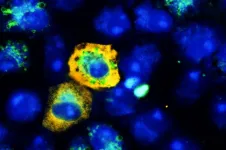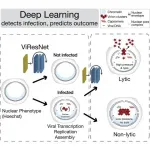Protein linked to heart health, disease a potential therapeutic target for dementia
Brain protein reduces Alzheimer's-like brain damage in mice
2021-06-21
(Press-News.org) By the time people with Alzheimer's disease start exhibiting difficulty remembering and thinking, the disease has been developing in their brains for two decades or more, and their brain tissue already has sustained damage. As the disease progresses, the damage accumulates, and their symptoms worsen.
Researchers at Washington University School of Medicine in St. Louis have found that high levels of a normal protein associated with reduced heart disease also protect against Alzheimer's-like brain damage - at least in mice. The findings, published June 21 in Neuron, suggest that raising levels of the protein -- known as low-density lipoprotein receptor (LDL receptor) -- could potentially be a way to slow or stop cognitive decline.
The discovery of LDL receptor as a potential therapeutic target for dementia is surprising since the protein is much better known for its role in cholesterol metabolism. Statins and PCSK9 inhibitors, two groups of drugs widely prescribed for cardiovascular disease, work in part by increasing levels of LDL receptor in the liver and some other tissues. It is not known whether they affect LDL receptor levels in the brain.
"There are not yet clearly effective therapies to preserve cognitive function in people with Alzheimer's disease," said senior author David Holtzman, MD, the Andrew B. and Gretchen P. Jones Professor and head of the Department of Neurology. "We found that increasing LDL receptor in the brain strongly decreases neurodegeneration and protects against brain injury in mice. If you could increase LDL receptor in the brain with a small molecule or other approach, it could be a very attractive treatment strategy."
The key to the importance of LDL receptor lies in a different protein, APOE, that also is linked to both cholesterol metabolism and Alzheimer's disease. High cholesterol in the blood is associated with increased risk of Alzheimer's disease, although the exact nature of the association is unclear.
During the long, slow development of Alzheimer's disease, plaques of a protein called amyloid gradually accumulate in the brain. After many years, another brain protein called tau starts forming tangles that become detectable just before Alzheimer's symptoms arise. The tangles are thought to be toxic to neurons, and their spread through the brain foretells the death of brain tissue and cognitive decline. First author Yang Shi, PhD, a postdoctoral researcher, and Holtzman previously showed that APOE drives tau-mediated degeneration in the brain by activating microglia, the brain's cellular janitorial crew. Once activated, microglia can injure neural tissue in their zeal to clean up molecular debris.
Higher levels of LDL receptor limit the damage APOE can do in part by binding to APOE and degrading it. Higher levels of LDL receptor in the brain, therefore, should pull more APOE out of the fluid surrounding brain cells and mitigate damage even further, the researchers reasoned.
As part of this study, Shi, Holtzman and colleagues including co-senior author Jason Ulrich, PhD, an associate professor of neurology, studied mice predisposed to develop Alzheimer's-like neurodegeneration because they had been genetically modified to develop tau buildup in the brain, much like people with Alzheimer's disease and other forms of dementia. The researchers bred the tau mice with mice genetically modified to express high levels of LDL receptor in their brains. The resulting offspring had high levels of LDL receptor and a propensity to develop Alzheimer's-like brain damage by the time they were 9 months old, which is similar to middle age in a person.
Then, the researchers compared the four groups: normal mice, tau mice, mice with high levels of LDL receptor, and tau mice with high levels of LDL receptor. At 9 months, the normal mice and the mice with high levels of LDL receptor had healthy looking brains. The tau mice had severe brain atrophy and neurological damage. In comparison, the tau mice with high levels of LDL receptor were in much better shape. They had significantly less brain shrinkage and damage, their levels of certain forms of tau and APOE were significantly lower, and their microglia were shifted toward a less damaging pattern of activation.
"Alzheimer's develops slowly through multiple phases, and the degeneration phase when tau is building up is when the symptoms arise and worsen," Holtzman said. "In terms of quality of life for people with Alzheimer's, this is a phase in which it would be great if we could intervene. I think this LDL receptor pathway is a good candidate because it has a strong effect, and we know it can be targeted in other parts of the body. This has motivated us over the last few years to try to develop programs to modulate the receptor in other ways."
INFORMATION:
[Attachments] See images for this press release:

ELSE PRESS RELEASES FROM THIS DATE:
2021-06-21
An investigational Alzheimer's drug reduced molecular markers of disease and curbed neurodegeneration in the brain, without demonstrating evidence of cognitive benefit, in a phase 2/3 clinical trial led by researchers at Washington University School of Medicine in St. Louis through its Dominantly Inherited Alzheimer Network-Trials Unit (DIAN-TU). These results led the trial leaders to offer the drug, known as gantenerumab, to participants as part of an exploratory open-label extension. The researchers continue to monitor changes in measures of Alzheimer's disease in those participants who are receiving the drug.
The DIAN-TU study (ClinicalTrials.gov Identifier: NCT01760005), published June 21 in Nature Medicine, evaluated the effects of two investigational drugs - ...
2021-06-21
In the mid-2030s, multiple United States coastal regions may see rapid increases in the number of high-tide flooding (HTF) days, according to a study led by the University of Hawai'i at Mānoa and published today in Nature Climate Change. The combined effects of sea-level rise (SLR) and natural fluctuations in tidal range are anticipated to cause tipping points in the frequency of HTF.
Coastal locations around the U.S., particularly along the Atlantic coast, are experiencing recurrent flooding at high tide. The impact of HTF accumulates over numerous seemingly minor occurrences, which can exceed the impact of rare extremes over time. These impacts are subtle--for example, the loss of revenue due to recurrent road and business closures--compared with the physical damage of property ...
2021-06-21
Scientists studying a common childhood cancer have made a major breakthrough which could lead to a cure for some youngsters who would not have survived the condition.
An international study, involving Newcastle University, UK, has for the first time found a genetic marker in tumours from patients with high-risk neuroblastoma.
Research, published in the Journal of Clinical Oncology, has identified that alterations in the neuroblastoma's ALK (anaplastic lymphoma kinase) gene are associated with a significantly poorer prognosis for children with high-risk disease.
Experts ...
2021-06-21
Drugs routinely used during fertility treatments to release eggs do not increase the risk of developing breast cancer, new research has shown.
Researchers from King's College London, in partnership with King's Fertility, analysed studies involving 1.8 million women undergoing fertility treatments. These women were followed up in studies for an average period of 27 years and had no increase in the risk of developing breast cancer.
The research, published today in Fertility and Sterility journal, is the largest study to date assessing whether commonly used fertility drugs are for a cancer risk for women.
Fertility treatments can range from using medications to boost the release of an egg in a women's natural cycle to more complex ...
2021-06-21
A study by the University of Liverpool has shown that while asymptomatic COVID-19 testing in Liverpool was popular, significant inequalities were evident between those who got tested and those who didn't.
Published in the journal The Lancet Regional Health - Europe, the study found that 43% of residents aged over 5 years (n = 214 525) took up the offer of free testing for people without symptoms of COVID-19 between 6th November 2020 and 31st January 2021. A total of 1.3% of tests were positive, meaning that 5192 individuals who did not know they had the virus were notified ...
2021-06-21
The avian influenza, an acute viral infectious disease that occurs in poultry such as chickens, ducks, and migratory birds, has been reported to be transmittable to humans. It is difficult to control because it spreads among migratory birds that travel to China, Europe, and elsewhere. Once it is transmitted, it spreads rapidly. Disposing infected livestock is not only costly, but also a cause of serious environmental pollution. This is why vaccines against infectious diseases are imperative. To this, a research team in Korea has recently developed a plant-based, adjuvant-free, recombinant protein vaccine that exhibits a strong immune response.
Professor ...
2021-06-21
Researchers from the German Center for Infection Research (DZIF) at Charité - Universitätsmedizin Berlin and the University of Bonn have examined the way in which SARS-CoV-2 reprograms the metabolism of the host cell in order to gain an overall advantage. According to their report in Nature Communications*, the researchers were able to identify four substances which inhibit SARS-CoV-2 replication in the host cell: spermine and spermidine, substances naturally found in the body; MK-2206, an experimental cancer drug; and niclosamide, a tapeworm drug. Charité is currently conducting a trial to determine whether niclosamide is also effective against COVID-19 in humans.
Viral replication depends on host cell machinery and ...
2021-06-21
A blood test that can detect tiny amounts of circulating cancer DNA may be able to identify risk of cancer recurrence and guide precision treatment in bladder cancer following surgery, according to a clinical study led by Professor Tom Powles from Queen Mary University of London and Barts Health NHS Trust. The findings from the study, published in Nature, may change our understanding of cancer care following surgery.
The study found that patients with urothelial cancer who had a particular cancer DNA marker in their blood following surgery to remove their tumour had a higher likelihood of cancer relapse. These patients could benefit from subsequent treatment with an immunotherapy called atezolizumab.
Globally, ...
2021-06-21
In humans, adenoviruses can infect the cells of the respiratory tract, while herpes viruses can infect those of the skin and nervous system. In most cases, this does not lead to the production of new virus particles, as the viruses are suppressed by the immune system. However, adenoviruses and herpes viruses can cause persistent infections that the immune system is unable to completely suppress and that produce viral particles for years. These same viruses can also cause sudden, violent infections where affected cells release large amounts of viruses, such that the infection spreads rapidly. This can lead to serious acute diseases of the lungs or nervous system.
Automatic detection of virus-infected cells
The research group of Urs ...
2021-06-21
The authors of new research say supporting children and young people's mental health is as important as supporting their academic progress, and that particular attention should be paid to the fact that some young people have struggled more than others.
Findings from their study, published in the Journal of Affective Disorders, focused on the connections between loneliness, social contact, parental relationships, and the mental health of adolescents aged 11-16 during the first full UK lockdown from March to May 2020.
Their analysis drew on self-reported data from 894 young people who each completed a survey throughout to gauge their experiences of lockdown and its effects on their emotions, relationships, and feelings.
The team from the universities of Bath, Bristol, ...
LAST 30 PRESS RELEASES:
[Press-News.org] Protein linked to heart health, disease a potential therapeutic target for dementia
Brain protein reduces Alzheimer's-like brain damage in mice





